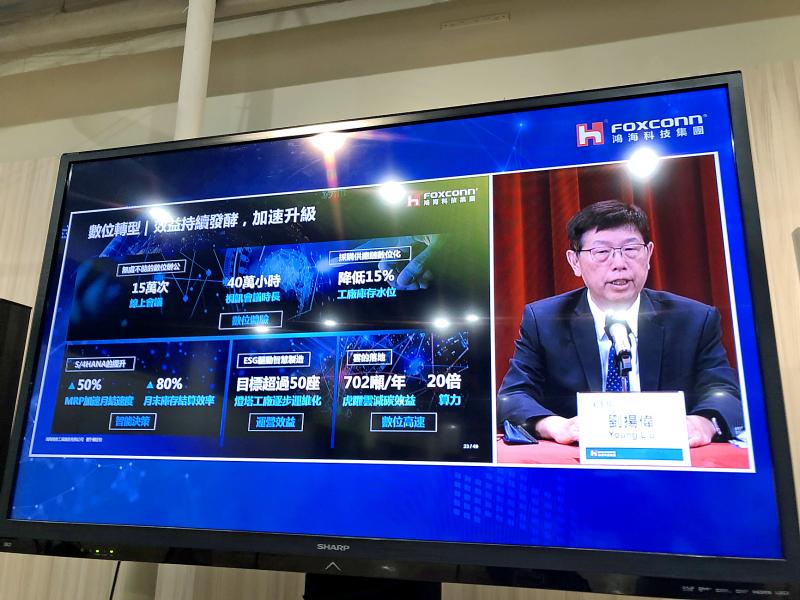Hon Hai Precision Industry Co (鴻海精密) is exploring new business opportunities in technologies related to low Earth orbit (LEO) and smart car connectivity, the company said yesterday.
Hon Hai chairman Young Liu (劉揚偉) last week said that an LEO satellite from Hon Hai might be seen in the sky next year, as the company aims to create more value and higher returns for its shareholders, while the firm told yesterday’s forum that Microelectronics Technology Inc (台揚科技), a 5G equipment and satellite component supplier that it fully owns via its subsidiaries, has tapped into the LEO satellite receiver market.
At the NExT Forum, organized by the Hon Hai Research Institute (鴻海研究院), industry experts discussed the development of 5G and 6G (B5G) technologies, as well as opportunities that lie beyond, focusing on LEO supply chains and their link to the fulfillment of autonomous vehicles.

Photo: CNA
Numerous applications rely on having full coverage of B5G, LEO and low-latency networks with high-reliability design, research institute chairman Wu Jen-ming (吳仁銘) said.
National Space Organization Director-General Wu Jong-shine (吳宗信) said that a large-scale company such as Hon Hai should tap into space travel and space colonies, adding that such businesses would drive growth over the next 20 to 30 years.
To meet growing demand for full Internet coverage, especially in rural areas, existing 5G networks can be integrated with 6G technology or LEO satellite technology, Wu said.
There are four LEO satellite projects globally: SpaceX’s Starlink, the UK and India’s Oneweb, Amazon.com Inc’s Project Kuiper and Canada’s Telesat, he said.
By the end of the year, Starlink is to take the lead with 3,400 satellites launched, he said.
Some local networking companies and precision machinery companies have joined Starlink’s supply chain, supplying ground equipment for satellites, he added.
Wu said he is upbeat about business opportunities related to LEO satellites, as there are expected to be 50,000 satellites in the sky by 2030, with 77.5 percent of them being LEO satellites.
The ground equipment segment in 2020 comprised a significant portion of the global space economy, contributing US$135.3 billion, data compiled by Bryce Space and Technology and Euroconsult showed.
The global space economy is expected to expand to US$1 trillion by 2040 from US$371 billion in 2020, Wu said.
The satellite industry accounted for 74 percent of the global space economy in 2020, he said, citing data from Bryce Space and Technology and Euroconsult.
The research institute, which was established in January last year, directs the exploration of next-generation telecommunications and semiconductor technologies. It has focused on 5G-related technologies, satellite payload technologies and the ability to deploy satellite receiving stations.

Sweeping policy changes under US Secretary of Health and Human Services Robert F. Kennedy Jr are having a chilling effect on vaccine makers as anti-vaccine rhetoric has turned into concrete changes in inoculation schedules and recommendations, investors and executives said. The administration of US President Donald Trump has in the past year upended vaccine recommendations, with the country last month ending its longstanding guidance that all children receive inoculations against flu, hepatitis A and other diseases. The unprecedented changes have led to diminished vaccine usage, hurt the investment case for some biotechs, and created a drag that would likely dent revenues and

Macronix International Co (旺宏), the world’s biggest NOR flash memory supplier, yesterday said it would spend NT$22 billion (US$699.1 million) on capacity expansion this year to increase its production of mid-to-low-density memory chips as the world’s major memorychip suppliers are phasing out the market. The company said its planned capital expenditures are about 11 times higher than the NT$1.8 billion it spent on new facilities and equipment last year. A majority of this year’s outlay would be allocated to step up capacity of multi-level cell (MLC) NAND flash memory chips, which are used in embedded multimedia cards (eMMC), a managed

CULPRITS: Factors that affected the slip included falling global crude oil prices, wait-and-see consumer attitudes due to US tariffs and a different Lunar New Year holiday schedule Taiwan’s retail sales ended a nine-year growth streak last year, slipping 0.2 percent from a year earlier as uncertainty over US tariff policies affected demand for durable goods, data released on Friday by the Ministry of Economic Affairs showed. Last year’s retail sales totaled NT$4.84 trillion (US$153.27 billion), down about NT$9.5 billion, or 0.2 percent, from 2024. Despite the decline, the figure was still the second-highest annual sales total on record. Ministry statistics department deputy head Chen Yu-fang (陳玉芳) said sales of cars, motorcycles and related products, which accounted for 17.4 percent of total retail rales last year, fell NT$68.1 billion, or

In the wake of strong global demand for AI applications, Taiwan’s export-oriented economy accelerated with the composite index of economic indicators flashing the first “red” light in December for one year, indicating the economy is in booming mode, the National Development Council (NDC) said yesterday. Moreover, the index of leading indicators, which gauges the potential state of the economy over the next six months, also moved higher in December amid growing optimism over the outlook, the NDC said. In December, the index of economic indicators rose one point from a month earlier to 38, at the lower end of the “red” light.